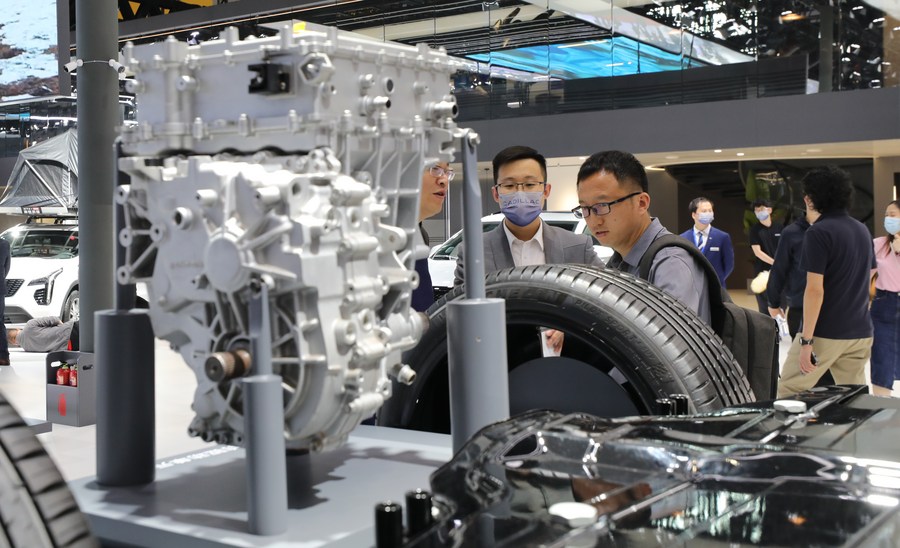Global automakers battling for share of China's NEV market


SHANGHAI -- Global carmakers are battling to showcase their best new energy products at the ongoing Auto Shanghai 2023, mirroring their efforts to gain a share of China's new energy vehicle market amid fierce competition.
The show's organizer said that around 1,500 vehicles are on display at the exhibition, with NEVs accounting for more than half. The arena, dominated by NEVs, also foreshadows technological trends in the global auto market.
Intense competition
Chinese auto brands are moving into the fast lane by going electric, and they are rapidly taking market share in China, putting more pressure than ever before on established global manufacturers.
According to the China Association of Automobile Manufacturers, China's NEV sales nearly doubled to 6.89 million units last year, accounting for over a quarter of the total automobile sales in the world's largest auto market.
Despite a downturn in the overall Chinese car market in the first three months of this year, NEV sales totaled nearly 1.59 million units, increasing by 26.2 percent from a year ago. The market share of NEVs in China's auto market topped 26 percent during the same period.
"The speed of growth here is much faster than in other regions of the world," said Oliver Blume, chairman of the Board of Management of Volkswagen AG.
The NEV boom is becoming a driving force for China's economic growth, and is also regarded as a crucial "growth pole" by global auto companies.
"China is a big automotive market with strong competition, which is positive for the customers, and it shows also the profit pools the Chinese automotive market has got," Blume said.
Data shows that China's leading NEV manufacturer BYD overtook Volkswagen and Toyota to become the best-selling passenger car brand in the first quarter in China, with total sales of 440,798 vehicles.
Emerging local electric vehicle companies, which have also seen stellar results, are trying to promote their most cutting-edge technology and products during the exhibition.
NIO debuted its high-end intelligent electric SUV ES6 and launched the updated electric flagship sedan ET7. The on-site demonstration of its third-generation battery swap station at the booth wowed the crowds of visitors. NIO's first 10 third-generation battery swap stations were put into operation on April 13 in 10 Chinese cities, including Beijing, Shanghai and Shenzhen, with a total of 1,342 swap stations built nationwide.
Accelerated transformation
The new local forces are also attracting attention from Western auto manufacturers that once dominated the Chinese market, as well as global auto parts suppliers, prompting them to accelerate their transformation in response to market changes.
Blume said he respects all the competition and is interested in how other companies think. "I will visit Chinese car brands like BYD, NIO, XPeng and others (during the auto show). For me, it's always inspiring," he said.
Also keeping a close eye on developments is Francois Marion, group communications and investor relations senior vice-president of French automotive supplier Valeo.
"There are two revolutions that are happening in the automotive world. One is electrification, and the other one is autonomous driving and driver assistance. China is at the forefront in these two directions," said Marion, adding that 18 percent of the company's global sales last year came from the Chinese market.
Marion's comments were echoed by Ralf Brandstaetter, chairman and CEO of Volkswagen Group China. "Electromobility and digitalization are the major drivers of the transformation in China. That is why Volkswagen is accelerating the development of intelligent and connected electric vehicles," he said.
Volkswagen brought 20 electric vehicles to the exhibition, including Volkswagen ID.7, which made its world debut at the event. By the end of 2030, the group will offer more than 30 all-electric models to customers in China.
"We come from a very strong position in the ICE (internal combustion engine) market. We want to keep it for the next several years while joining the strong ramp-up curve of electric mobility," Blume said.
Blume noted that Volkswagen will massively strengthen its local competencies, not only for e-mobility, but also in the areas of digitalization and autonomous driving, including software and R&D.
The group announced at the show that it will invest around 1 billion euros ($1.1 billion) in a new development, innovation, and procurement center for fully connected intelligent electric vehicles in Hefei, capital of East China's Anhui province.
"In the next five years, we will invest about 180 billion euros and a major part goes into electromobility, digitalization and connectivity, and the products in China will benefit from these investments," Blume said.
Japanese automaker Toyota unveiled two battery electric vehicle concept models at the auto show. They will be launched in the Chinese market in 2024 as two of the 10 BEV models that Toyota plans to release by 2026.
Even the global luxury carmakers such as Maserati have set their sights on the China's NEV market.
"The number of NEV brands that have been coming out in the last few years in China, and now the quantity of the cars they've been able to produce, is staggering," said Mirko Bordiga, managing director of Maserati Greater China.
On Tuesday, Maserati launched three new car products at the show, including an electric sports car and an electric SUV.
"We propose the electric cars because China is at the front of technology, and the market is growing dramatically, even though it didn't arrive yet in the same speed of volume in the luxury segments. But it's just a matter of time," Bordiga said.
The company said electrification will play a key role in Maserati's future strategy, with a commitment to produce electric versions of all its models by 2025 and full-electric vehicles alone by 2030.




































